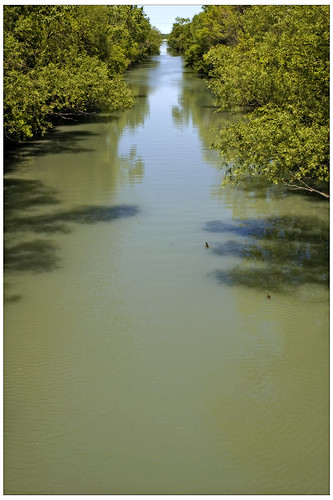Sounds like Green commissioner Saduh Johnston has some work to do. I'm just happy to find out the City has such a position, he'll be hearing from us soon enough.
Green Is the Color of my True Loves Hair actually taken of the North branch of the Chicago River.
Banned in Chicago . . . but available in stores Phosphates were outlawed in '71, but Daley isn't enforcing dad's law with dish detergents
More than three decades after Chicago banned phosphate-laden detergents to prevent foul-smelling algae from choking lakes and rivers, dishwasher soap made with the chemicals still dominates supermarket shelves.The anti-phosphates ordinance Mayor Richard J. Daley signed in 1971 became the model for similar efforts that helped revive the Great Lakes. But though the city's current mayor, Daley's son, promotes Chicago as one of the nation's most environmentally friendly cities, his administration rarely enforces the ban.
Few phosphate-free dishwasher detergents are available at Jewel and Dominick's, which account for about two-thirds of the city's chain grocery stores. Most major labels and store brands still have phosphate levels ranging from 3.3 percent to 8.7 percent. The levels in some specialty detergents are as high as 20 percent.
State lawmakers are poised to step in where the city has failed to act. Legislation moving quickly through the General Assembly would outlaw all but trace amounts of phosphates in household detergents as of July 2010.
...
Saduh Johnston, the city's environment commissioner, said he wasn't aware of the ordinance until Quinn recently brought it to his attention.“We realize it hasn't been aggressively enforced,” said Johnston, whom Mayor Richard M. Daley hand-picked three years ago to lead the mayor's green initiatives. “We would like to step up enforcement along with a statewide ban.”
Phosphates are water-softening and stain-removing ingredients added to laundry and dishwasher detergents after World War II. By the late 1960s, scientists had identified the caustic powders as major sources of phosphorus pollution that helped transform vibrant lakes into festering swamps, a process known as eutrophication.
The industry in question always wants more time to comply with any new environmental regulations:
“We've tried to market no-phosphate dishwasher detergents, but consumers flatly rejected them,” said Dennis Griesing of the Soap and Detergent Association, an industry trade group. “This compromise gives us time to complete the [research and development] on new formulas.”By then it will have been nearly 40 years since Chicago's ordinance took effect.
Tags: environment
... Naturally occurring phosphorus is an important nutrient for plants, but an oversupply in a lake or river fuels excessive algae growth that can kill fish and make drinking water taste sour. Just one pound of man-made phosphates washed down the drain can stimulate the growth of 500 pounds of algae downstream, according to the U.S. Geological Survey.Lake Erie highlighted the problem. The shallowest Great Lake once was so full of algae that when the tiny green plants died off, the decaying clumps sucked up oxygen and rendered much of the lake uninhabitable by fish and other creatures.
Armed with research documenting the problem, the first Mayor Daley pushed an ordinance banning phosphate-laden detergents in Chicago, one of the nation's largest markets. Laundry and dishwasher soaps at the time were nearly half phosphates by weight.
...
The city's ordinance did not help the Great Lakes directly -- Chicago's runoff goes to the Mississippi River -- but more than half of the states later enacted similar laws.Detergent makers have spent most of the last three decades fighting to keep phosphates in their products, first in the courts and later through marketing. The industry eventually agreed to limit concentrations in most products to 8.7 percent and stopped making phosphate laundry detergent in 1994.
Yet most dishwasher soaps still contain phosphates, and enforcement of the laws against them is spotty nationwide.
and of course, money talks loudest:
As recently as January, leading manufacturers insisted they could not make phosphate-free dishwasher detergents that were effective. But a few companies have switched to detergents that rely on enzymes instead of phosphates. In March 2005, Consumer Reports gave high ratings to a handful of phosphate-free brands, including Seventh Generation, Ecover Natural and Trader Joe's.Earth Friendly Products, a Winnetka company that makes cleaning products without toxic chemicals or petroleum-based substances, has applied for a patent on its phosphate-free dishwasher detergent.
..
Cutting the flow of phosphates has helped clean up lakes and rivers. But algae blooms remain a slimy scourge. When Chicago's treated sewage flows into the Mississippi, it joins agricultural fertilizers washed into tributaries across the Midwest to contribute to a “dead zone” hundreds of miles away in the Gulf of Mexico.The Metropolitan Water Reclamation District, the agency that treats human and industrial waste in Chicago and Cook County, is not required to filter out phosphates, though that could change under recent federal and state standards aimed at improving water quality in rivers and lakes.
The district calculates that banning the chemicals in dishwasher detergents would keep about 700 tons of phosphorus a year out of the environment, enough to potentially create 350,000 tons of algae.
“When you start to add all of these efforts up, it can make a big difference,” said Richard Lanyon, the district's general superintendent.
Other sources of phosphate pollution include industrial cleaners and fertilizers. Those chemicals would remain legal under the proposed Illinois law.
Washington state approved a phosphates ban last year. When Illinois and Maryland lawmakers started to push their own, the soap companies decided to back a 2010 deadline to remove the chemicals from their products nationwide.

